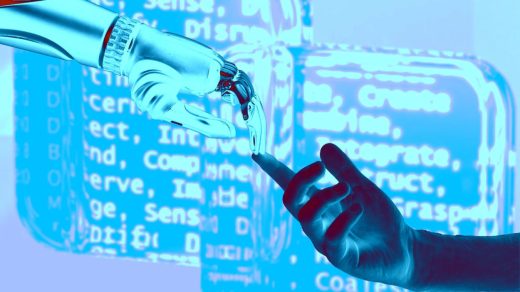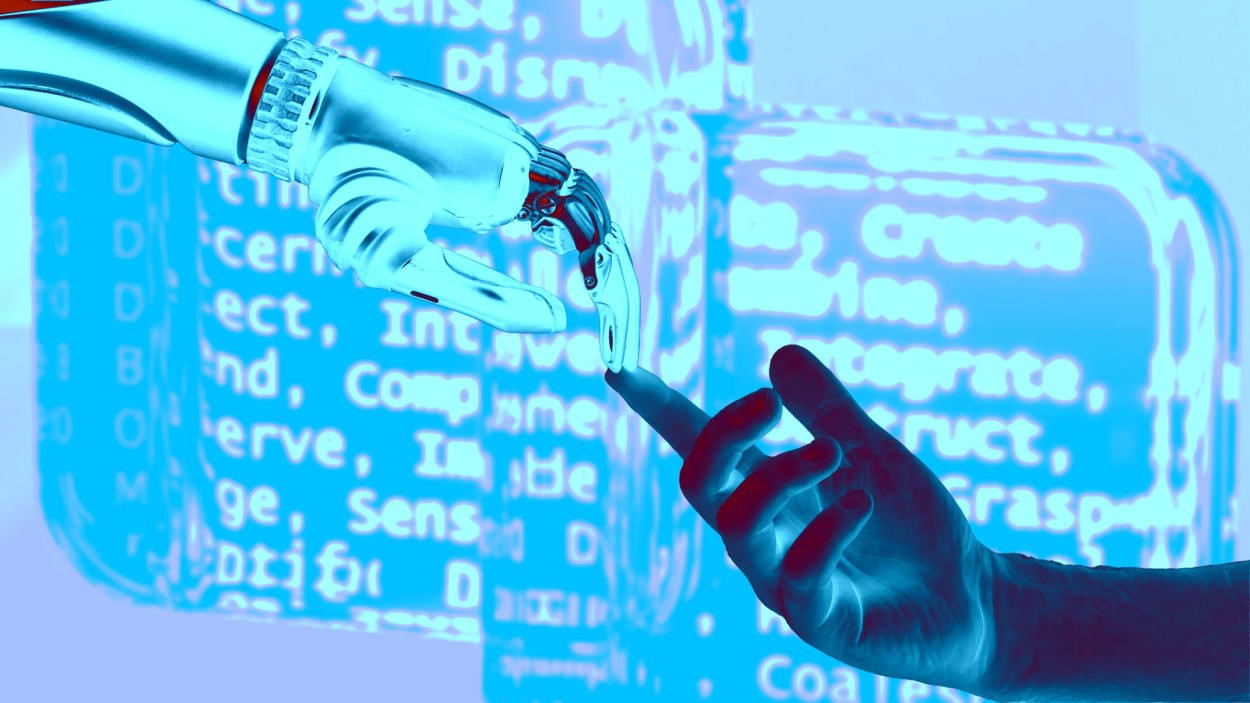Is the AI afterlife coming? According to these 2 Sundance documentaries, it’s already here
From healthcare to Hollywood, the emergence of artificial intelligence has dominated the conversation in almost every industry in the past year. Another area where AI is becoming more prominent? The death industry.
The idea is that after a loved one dies, you can use AI to “speak” with them—and if it feels like something right out of Black Mirror, that’s because it kind of is. In a 2013 episode of the sci-fi series, a widow copes with the sudden death of her husband by signing up for a service that aggregates his online presence and social media posts to create an AI imitation of him. In 2024, that scenario is becoming closer to reality. Two different documentaries that premiered at the Sundance Film Festival last week—Eternal You and Love Machina—explore the subject at length in fascinating and unsettling ways.
In Eternal You, filmmakers Hans Block and Moritz Riesewieck, the duo behind 2018’s The Cleaners on the world of content moderation, take a look at some of the tech startups getting into the business of “digital afterlife” as well as the people using the services.
Block says he and Riesewieck got the idea for the documentary after discovering a site that promoted virtual immortality. They quickly found other companies trying to get in on the concept.
“There are startups all around the world competing for a new market—the market of digital immortality,” Block tells Fast Company. “So there was an idea born, that we can use AI, which is very much human-like and we can interact with, and maybe that’s the starting point of a new narrative of the afterlife—the digital age.”
Riesewieck adds that another area he and Block were trying to explore is the idea of how people deal with death and grief when they turn away from religion.
“The tech industry obviously understood that,” Riesewieck tells Fast Company. “That there is a strong need and desire to find new forms of salvation and jump in with an entity which is perfect for projecting a lot of stories of hope, and a superpower, onto it—namely AI.”
One such service featured in the documentary is Project December, founded by Jason Rohrer in 2020. It simulates conversations with the dead in the form of chatbots. The audience is introduced to Joshua Barbeau, who uses the service to simulate communication with his late fiancée, Jessica Pereira. (Barbeau garnered online attention in 2021 after writing about his experience in the San Francisco Chronicle.) During a somber moment in the film, he recalls chatting with the simulation all night, referring to it as “a gift.” The film also shines the light on complaints from an unhappy customer who claimed the simulation of her late father used profanities at her.
Rohrer, who has complained about his portrayal in the film, tells Fast Company that Project December’s purpose wasn’t initially intended to simulate dead loved ones, but rather as an “art and entertainment experience” to replicate public figures like William Shakespeare or Sigmund Freud. But after Barbeau’s story, more people used the service to speak to virtual loved ones. (The current tagline of the site uses the phrase “Simulate the dead.”) Rohrer says this was his way of trying to help people like Barbeau who had a difficult time finding solace in support groups.
“I’m not a grief therapy expert,” Rohrer says. “But people claim to be helped by it.”
Some of the other companies highlighted in the documentary include HereAfter AI, which lets users record conversations to create digital versions of themselves after they’ve passed away; YOV, which records conversations with loved ones when they’re still alive in order to re-create conversations when they’re deceased; and Soul Machines, which creates digital avatars that look, sound, and mimic humans. During one sequence in the documentary, cofounder Mark Sagar of Soul Machines is seen testing Baby X, a prototype modeled after his own newborn baby.
The documentary also gives the floor to technology critics like Carl Öhman, who notes that major corporations like Amazon and Microsoft have filed patents for digital-afterlife-related services using AI and states that he’s “shocked” by how fast it’s become a product that can be sold to a broader market. In the documentary, he says: “If this industry is beginning to be lucrative, we’re definitely going to see tech giants presenting similar services.”
Filmmaker Riesewieck says the topic of AI is complex, and while he understands the anger and anxiety around the technology potentially taking away jobs, he admires the progress AI has made in areas like medicine and predicting climate change in certain cities. Still, he says people should be wary.
“One of our main ambitions with this film is to deconstruct false narratives,” Riesewieck says. “In this industry of effective computing and human machine interactions, the industry tends to tell us that machines are intelligent. Whenever we hear something like this, we need to question what kind of intelligence this means.”
Meanwhile, in Peter Sillen’s documentary Love Machina, the focus is on Bina48, a humanoid AI owned by futurist couple Bina and Martine Rothblatt, who have modeled the robot’s physical appearance after Bina so they can transfer her consciousness into it.
Sillen says that over time, as technology progressed, the story of his documentary started to really take shape as it became more relevant to the rise of AI. When ChatGPT launched in 2022, Sillen said Bruce Duncan, the managing director of the Terasem Movement Foundation (founded by Rothblatt), incorporated ChatGPT into Bina48.
“Bina48 was built in 2007 and that was before Siri and Alexa, so it was ahead of its time,” Sillen tells Fast Company. “When we first started developing the documentary in 2017, I never had any idea that our filmmaking would parallel the path of development of these large language models to the place where it is today.”
While Sillen’s documentary touches on other areas of immortality like cryonics, he says the conversations about AI and the advancement of technology are important to have now.
“We just have to put up guardrails and make sure that people are safe and that the technology is safe in the here and now,” Sillen says. “But I think it’s moving to this point where I don’t know that we’re going to be able to stop the idea that your digital fingerprint is going to exist somewhere in some way, shape, or form in the future.”
(24)



